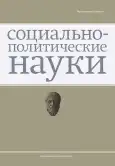Алиментный фонд как способ защиты права ребенка на получение содержания
- Авторы: Летова Н.В.1
-
Учреждения:
- Институт государства и права РАН
- Выпуск: Том 12, № 3 (2022)
- Страницы: 75-81
- Раздел: Статьи
- URL: https://journal-vniispk.ru/2223-0092/article/view/146974
- DOI: https://doi.org/10.33693/2223-0092-2022-12-3-75-81
- ID: 146974
Цитировать
Аннотация
Цель исследования. В настоящей статье автором рассматриваются вопросы теории и практики, связанные с потребностью создания в нашей стране алиментного фонда как одного из способа обеспечения прав ребенка на получение содержания в виде алиментов. Потребность в создании такого фонда обусловлена существующей проблемой своевременной выплаты алиментов детям, что является существенным нарушением их имущественных прав. Участие государства в решении такой проблемы позволит создать дополнительные гарантии для детей, обеспечить реализацию их права на содержание и удовлетворение базовых потребностей. Автор приходит к выводу, что отсутствие надлежащего нормативного регулирования алиментных отношений в контексте развития алиментных фондов, указывает на системные проблемы в праве, и как следствие на практике, в решении вопросов о ведомственной принадлежности таких фондов, сущности денежных средств, которые формируют его содержание и возможности применения гражданско-правовых институтов к таким отношениям.
Ключевые слова
государственная социальная политика, государственная семейная политика, социальное обеспечение, семья, дети, гарантии, воспитание и содержание детей, алименты, содержание, обязанности родителей, ответственность родителей, алиментные обязательства, алиментный фонд, уклонение, неустойка, исполнительное производство
Полный текст
Открыть статью на сайте журналаОб авторах
Наталия Валерьевна Летова
Институт государства и права РАН
Email: letovanv@mail.ru
доктор юридических наук; заместитель директора по научной работе, главный научный сотрудник сектора процессуального права Москва, Российская Федерация
Список литературы
- Антокольская М.В. Семейное право: учебник. М.: Юрист, 1996.
- Букшина С.В. Право ребенка на получение содержания от своих родителей: вопросы осуществления // Семейное и жилищное право. 2012. № 3. С. 12.
- Гонгало Б.М. Алиментное обязательство // Семейное и жилищное право. 2016. № 5. С. 16.
- Гришаев С.П. Алиментные обязательства // СПС «Консультант Плюс». 2011.
- Дзюбровская Л.В. Соглашение об уплате алиментов - самостоятельный семейно-правовой институт // Семейное и жилищное право. 2012. № 6. С. 13.
- Иоффе О.С. Советское гражданское право: курс лекций. Т. 3, Л., 1965. С. 262.
- Капитова О.В. Правовая природа механизма алиментирования в семейном праве Российской Федерации. М., 2010. С. 34-37.
- Комментарий к Семейному кодексу РФ / отв. ред. О.Н. Низамиева. М.: Проспект, 2010. С. 323.
- Ксенофонтова Д.С. Нотариальное удостоверение соглашения об уплате алиментов как правовая гарантия осуществления и защиты прав и интересов субъектов алиментного правоотношения // Нотариус. 2014. № 4. С. 19-22.
- Левушкин А.Н. К вопросу об алиментах и последствия невыполнения алиментных обязательств // Исполнительное право. 2011. № 2. С. 17-21.
- Летова Н.В. Правовая природа соглашений об уплате алиментов: проблемы материального и процессуального права // Социально- политические науки. 2021. № 3. Т. 11. С. 133-140.
- Пергамент А.И. Алиментные обязательства по советскому праву. М., 1951. С. 6.
- Пчелинцева Л.М. Семейное право России: учебник для вузов. М.: Норма, 2007. С. 391.
- Ржаницына Л.С. Алименты в России: Анализ проблем и стратегия в интересах детей. М., 2012. С. 23-26.
- Савельев Д.Б. Соглашения в семейной сфере. М., 2010. С. 71.
- Серебрякова А.А. Проблемы правового регулирования и практики применения соглашения об уплате алиментов // Нотариус. 2015. № 6. С. 21-24.
- Соловьев В.Ю., Орлова А.В. Актуальные проблемы защиты прав и законных интересов несовершеннолетних в исполнительном производстве // Современное право. 2021. № 9. С. 69-75.
- Тресцова Е.В. Материально-правовые гарантии обеспечения имущественных интересов несовершеннолетних в семейном праве.
- Усачева Е.А. Проблемы определения предмета и субъектного состава соглашения об уплате алиментов // Актуальные проблемы российского права. 2014. № 8 (45). С. 1656.
Дополнительные файлы








